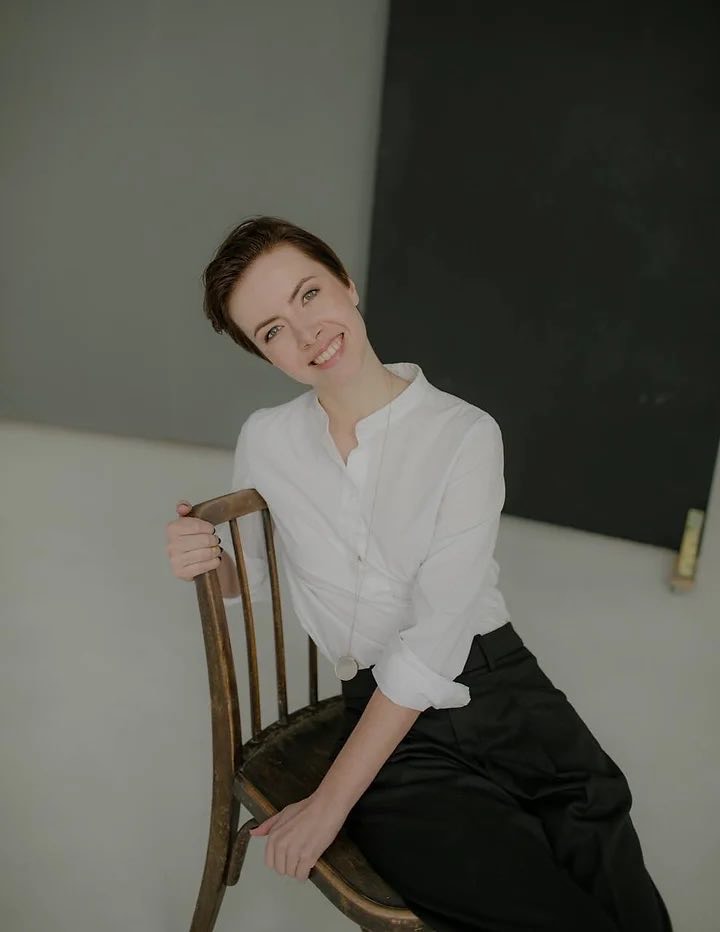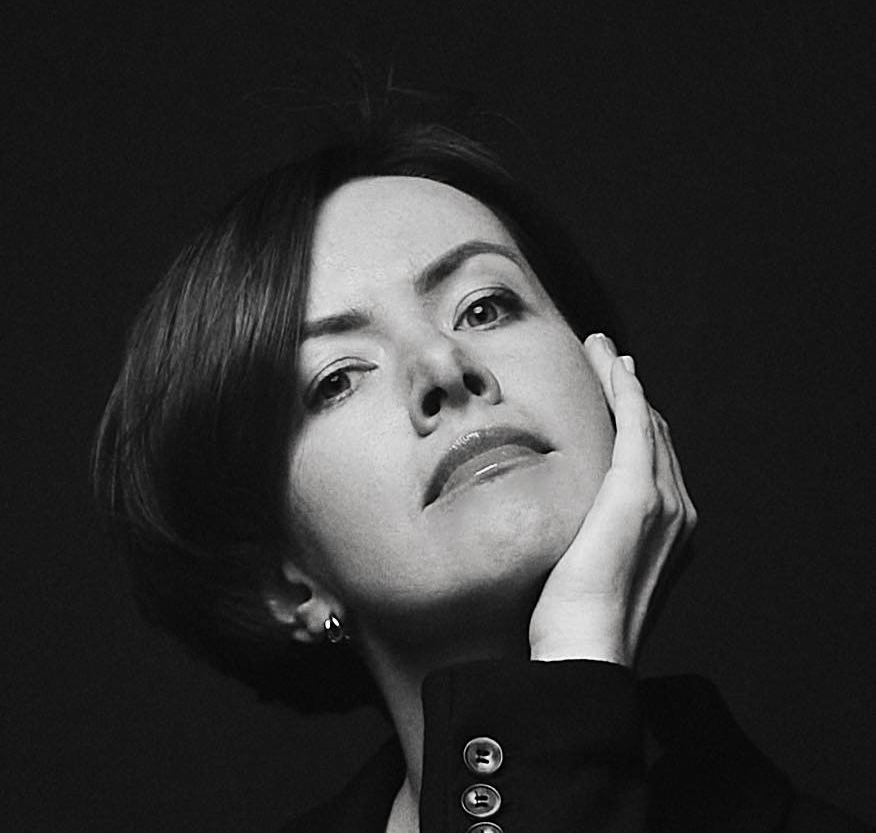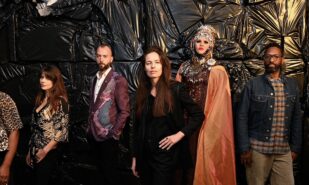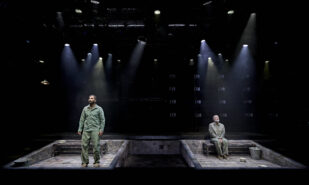Elena Nenasheva, a graduate of the directing program at the MXAT School-Studio and the Vsevolod Meyerhold Center (Victor Ryzhakov’s workshop), a nominee for the 2020 Russian National Theater Prize “Golden Mask”, is now a director and lecturer living and working in London. Currently, she is engaged in a remarkable project called Deep – evenings of dates elegantly directed by Elena and transformed into a game – dates for couples, whether newly acquainted or long-married; the main thing is that they find it interesting to play and learn about each other. We talked to Elena about this project.
Elena Nenasheva: “People on first dates don’t buy food”

– The first shows in London have already started, but you began in Paris. Why?
– It was quicker to find a location in Paris, so we held our first show there and will continue. Initially, as a director, I thought at some point that I wanted to create a small performance in London, but without actors, because staging a play with actors in this city is very expensive. This is a difference between independent theater in Moscow and London. I had a play in Moscow called “After,” which cost 400,000 rubles, including renting an old apartment in the center of Moscow. Here, I estimated a cost of 100,000 pounds; you can’t put on a play here without significant investments.
– Or a festival with a venue where you sell a bunch of tickets to break even!
– Yes. Since I love working with interactive theater, why not try something with a simple location like a cafe, like where we are sitting now. People who come have a predefined path which helps them get to know each other better.
– So, the rules of the game are set in advance?
– Yes, but it still allows them to express themselves differently each time, based on their personalities. Then I realized that this isn’t really a play, but a startup in the form of dating. Initially, we wanted to create classic dating for singles: two partners, two blind dates per evening. But – this is why we need test shows – interesting things emerged! When we conducted the first test in Paris, something happened that my co-founder Masha Titova and I, perhaps because we are women, hadn’t considered. Women are ready to come to an event for an adventure, not knowing whom they’ll meet. But all the men say, “Oh, very interesting, but please send photos of those I will be talking to.” And here, as soon as it involves matchmaking, you’re suddenly in the territory of the big players, and then you need to make an app, which requires huge investments and faces huge competition, basically, it’s a very big, long, and complex path. For the test evenings in Paris, since we just needed to test the game itself, we invited several existing couples, and surprisingly found that the idea works super well for them. And a second funny insight: people who come on first dates don’t buy food, they don’t want to spend money on each other, they just order two glasses of wine, and that’s it. Our business model with venues is based on bringing people in. We don’t pay rent, but our guests are supposed to order food. And so we realized we have created a format of an immersive, unifying experience for existing couples.
– They talk as if they’re seeing each other for the first time?
– Yes. People at some point stop truly talking to each other about deep topics. Their communication becomes a bit too mundane, like “buy a loaf of bread.” And our game for them is a way to fall in love with each other all over again, to remember why they liked this person so much once. And one of my favorite stories: we had a wonderful couple at the game, they’ve been together for many years. One of the questions was: “How did you realize you were in love?” And the husband just started telling his wife how he fell in love with her, apparently something he hadn’t said in a long time, and she cried. And it was such a beautiful touching moment. I especially love when genuine emotion arises spontaneously. Yes, when something like that happens. But at the same time, our game is a great format for those who have recently started dating. They have the opportunity not to spend a lot of time to really understand if this person is right for them, because the game is structured in such a way that we include a lot of interesting and exciting questions about love and sex, in addition to various interactive tasks that involve your five senses, we also added uncomfortable questions that everyone is too shy to ask.
– For example?
– For example, who should pay on the first date. When people start answering and explaining why, it says a lot about their financial model as a couple. And actually clarifies expectations for both sides. Or here’s a question, do you want to have children and why. Everyone is concerned about this, but it’s hard to ask on a first date because you immediately look a bit creepy. But here, the players within the created structure are asking, not you, so you’re freed from responsibility, yet you can hear what matters to you.
– How many questions are in the game and how many couples participate?
– 40 cards and 20 couples. Twenty couples just make sense for us financially, because we tried to make the ticket reasonably priced for London, meaning a ticket for a couple includes two glasses of wine and costs 50 pounds. So effectively, for one person it’s like going to the movies, 25 pounds. And we didn’t want to deviate from this model at the first stage. We talked about pricing, that we tried to make a ticket comparable to the cost of going to the movies in this city. We found a great place to partner with, the Must Wine chain of wine bars, and they have a wonderful bar in Islington. This is one of my favorite bars, because it’s near Sadler’s Wells, where I always go to see plays, and we always go there with friends to drink wine. They have a terrific selection of wines, delicious food, reasonable, affordable prices, and a pleasant interior, and a large number of tables that suit us.

– So, it’s a mid-range project.
– Definitely, but we are thinking about an alternative strategy where we move into a premium format and make far fewer events, but with a higher check. We like this idea too, but more as a premium edition of the brand. In these settings, I’m thinking not even about a restaurant, but about a weekend format for couples, when they go away to some castle, and there are a number of activities: our game, perhaps a sensual tantric training, jazz in the evening.
– It sounds a lot like, but with a plus sign, John Fowles’s “The Magus.”
– Yes, it’s about the atmosphere created around the couples so they step out of… routine, yes. We have a lot of ideas for how to scale it, we are also thinking about partnerships with major dating apps. Our project could become a feature inside an app, when users who like each other are offered a first date option. But again, first you need to build your brand, become known, prove that it all works.
– Are there ever unplanned situations? Forty questions, some of them provocative… Could a couple leave not as a couple?
– I love such questions. What can I say as a person who has seen people get divorced after a play? I had one of my first plays, which I made even before entering the master’s course at the director’s course of Victor Ryzhakov, it was called “Love. Overheard” and included six documentary stories about love. One of the audience members wrote me a long letter saying that she had decided to divorce her husband after watching this play. Because she realized that she deserves the kind of love that was in the play, not what was happening in her life. But honestly, I consider that a happy ending, not a tragic event. I think any tool that helps us understand whether a person is right for us or not is a good tool. Yes, we cannot guarantee you a good companion for the evening – you are responsible for your companion. But we can guarantee that it will definitely be an interesting experience for both of you. For example, there’s a little candy on the table, and one of the cards has a task: “There’s just one chocolate here, decide who will eat it.” Some try to share, some give in, but there were situations where the girl ate the candy before the game started, and in the middle of the game comes that card, and there’s no candy left… The main insight of the game is that people really look at their partners from a different side and learn a lot of interesting things about them. Can someone break up in the process? Well, let’s just say, such a task is not built into this construction. I think the likelihood of this is small, but maybe those who subconsciously came with such an intention might break up. But I just consider that a positive outcome.
– Are you planning to expand further? I heard about Dubai.
– Dubai is already in the plans, but right now the closest cities we have started working on are Berlin and Barcelona. Probably Istanbul will be next. This is also a separate interesting question. For startups, there is a golden rule: don’t try, don’t know. It’s impossible to predict in advance, but right now we have a hypothesis, purely theoretical. We think this project might be more successful, for example, in Northern Europe, where people are more closed off, restrained, and find it harder to talk to each other. But we will also try it in Barcelona! Maybe our assumption is completely wrong, and instead, it will work great in Spain and Italy. We are trying very different cities in terms of mood, but the main thing that unites them – they are all expat cities. An expat is a person who is capable of moving to live in another country, and they are a priori often open to some experiments.
– Does the deck change from city to city, from country to country?
– Only the language changes. In Paris, for example, the cards are in French and English.
– You’ve worked a lot in immersive theater, can your project be called a play? Do the people who come become actors within the set framework?
– Clearly, this uses my experience in immersive theater, but… Elena Kovalskaya answered well the question of what to call theater in the modern world: anything that the artist themselves calls theater, we also call theater. I wouldn’t exactly call our project a play, it’s more correct to use the word experience, we came up with the term immersive dating. At each show, a hostess from our project is present. If anyone has any questions, they can come for help. Guests might want to share their impressions at the end, and for that, there also needs to be someone they can tell what they felt, what they think, what happened to them. This is important work, in London at first I will work in this position myself, because I want to see for myself how the project works, fine-tune everything, understand what problems might arise. In other cities, we are now looking for hosts, applicants must be bilingual – English and the language of the country the project is operating in. For me, it was an interesting insight that in Berlin, no one speaks German. Ten people wrote, all wonderful, with great minds, remarkable people. Several years living in Berlin, but no German. I find that incomprehensible. I think I would have died if I had to live in a country for several years without knowing the language.

– Have you been in London long?
–I left six months after the war started because, firstly, like all artists with an anti-war stance I was banned, and secondly, I didn’t want to stay and support what is happening now. Recently, my partner and I discussed whether we want to do this game in Moscow. Well, because it would be ten times easier than in Europe, and considering that many apps have left, it’s an ideal opportunity to make a lot of money very quickly. But our value position – no, we don’t want to, precisely because we don’t want to support with our taxes what is happening now. Why didn’t I leave immediately? Because I didn’t want to leave through a program, as one of my friends very ironically said about it, through the program “Panties and Beads.” This is when you just break away without any plan and without money, go to Yerevan. I always need a clear plan, and I wanted to leave legally. Initially, I left for London to study on a student visa because I was accepted into a master’s program in filmmaking in London, and basically, the first year I was just coming to terms with everything and studying. Now I have received a global talent visa and am on this, generally, the most wonderful visa possible.
– If we return to your theatrical works, the play “Posle” – is a play about life after a breakup. Can it be said that Deep is about rediscovering the taste for life after loss? About how you can feel again?
– I think that’s a beautiful logical connection, I like it, but it’s not like that. After I moved, I spent a year learning to make films, continued working as a director by inertia, made several films, released a play in Barcelona, did another small apartment play here in London. I was under anesthesia because before the war and all this horror, I had a beautifully developing career in Moscow. 2022 was fully booked until the end of the year, I had six huge projects, I was very much in love. And then I lost everything, it was the first time in my life I had depression, and I’m not prone to depression, no matter what happens. So for a year I lived as if under anesthesia. This is probably a very good state for emigration, because while all my classmates were nervous, freaking out because they couldn’t find an apartment, register a phone, a bank account, I wasn’t worried about it. Apparently from such a huge emotional explosion that happened in me, I was in a state of frozen emotions for some time. For some time I continued to work, immediately after the war began, while still in Russia, I made a film, a project for admission to film school. It was a short film about torture at the OVD Brateevo police station. Which, believe me, was not the easiest task in Russia in March 2022. I based it on documentary interrogation texts, which were fully printed by Novaya Gazeta, and I expanded, created a universe around it. The main characters were a lesbian couple, one of them an artist who goes to protests, and her partner an employee of a large state corporation, who says that it’s not so straightforward. After this interrogation, the couple breaks up. Although I’m not a political artist, I wanted to make a film about the point of no return. For all of us, these circumstances became a boundary when you made a decision, and either lost everything except your conscience, and that’s a new difficult life, but in which you’ve preserved yourself, or you stayed in a comfortable environment, but gave up freedom as one of your key values. And when I got back in touch with myself after a few months of emigration, I found it uninteresting to make art. Reality is so much more insane that it’s unclear what to do on stage now. Sounds, perhaps, tragic, but there’s no tragedy in it.
– You came into theater as an already established professional in marketing?
– Theater was my big dream, I applied to Ryzhakov’s, already deciding that I would go study in London, but at the last interview with Viktor Anatolyevich it turned out that they were taking me. I was so tired of the sexism, after several years reaching the final round and they chose a boy, that I told him: “I don’t care, I’m leaving for London, I know you’re all sexists here, I’m tired of banging my head against closed doors!” And then I reached my crystal dream, made plays, sometimes in the snow, rehearsing for 14 hours, I felt I was talking about something important, making the world better. And then, when all this total horror happened… No, it’s clear that the world hasn’t changed, bloody wars have always been there, but I lost faith in goodness. I continued to do creative projects by inertia, but inside I no longer had it. Although my short film, which I shot here, was selected for BUFF, and supposedly I did well, right? But I myself lost internal motivation. They say if the horse is dead – get off. That’s the principle I decided to use, at least for the next year, I want to work on a new project, then check in with myself, understand how things are, and decide what to do next. And I haven’t completely rid myself of my snobbery, because in Moscow I had great opportunities, and after I made plays in huge expensive locations with huge budgets, returning to a black cabinet with one actor is now uninteresting to me. Maybe that will pass. I’ll wait.





